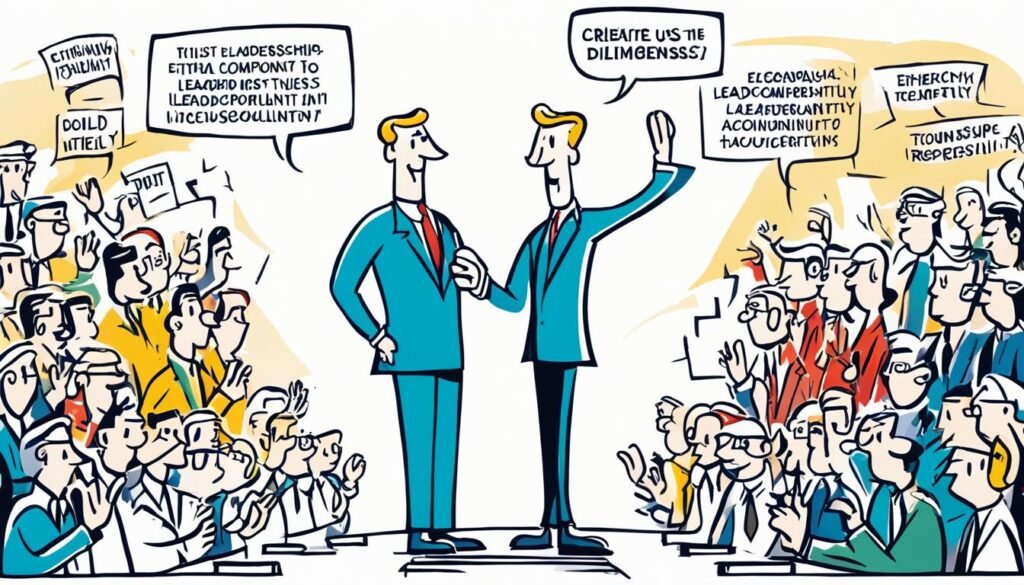Leadership Ethics: Guiding Principles
“The function of leadership is to produce more leaders, not more followers.” – Ralph Nader
Ethical leadership isn’t just about choices we make. It’s also creating a place where honesty and responsibility matter. In our fast-paced world, leaders face many hurdles. They must keep their ethical compass straight. By sticking to these guiding principles, they make their places better for all.
Key Takeaways:
- Ethical leadership is based on respect, service, justice, honesty, and community.
- Respect means caring about what others want and need.
- Service focuses on helping your team and building a community.
- Justice is about being fair and not playing favorites.
- Honesty is key for trust and clear communication.
The Importance of Respect in Ethical Leadership
Respect is a key value in ethical leadership. It means treating others well and caring about their goals and freedom. For a leader, respect goes far beyond being polite. It means truly valuing people’s worth and what they bring, no matter who they are.
Leaders who show respect listen to different ideas and honor differences. They make a space where everyone feels talented and appreciated. Respect helps build trust and teamwork in the workplace.
“Respect for ourselves guides our morals, respect for others guides our manners.”
– Laurence Sterne
Showing respect is crucial not just in principle but for creating a good workplace. When people are respected, they are happy, motivated, and effective. This boosts not only their work but their whole life satisfaction.
A Harvard Business Review study found that when leaders respect their team, the team stays longer and is happier and more dedicated.
Treating Others with Respect: Ethical Leadership Best Practices
Here are some top tips for respectful leadership:
- Listen closely to others, giving them time to share without cutting them off.
- Value the unique views and skills that each person has.
- Don’t rely on stereotypes or make guesses about people because of their gender, race, or age.
- Give advice and feedback in a kind and helpful way.
- Prize your team’s achievements and work.
- Create a place where everyone feels safe to speak up and be themselves.
Respect in Action: A Story of Ethical Leadership
Consider the story of Satya Nadella, the CEO of Microsoft, to see respect in ethical leadership. Nadella has built a reputation for being respectful and inclusive. He encourages everyone to share their thoughts, no matter their role.
His focus on respect has made a place where diverse talent thrives. This has boosted innovation and teamwork at Microsoft. His leadership has helped the company grow by fostering a culture of respect, inclusivity, and ethical values.
Choosing respect is how ethical leaders make workplaces that celebrate everyone’s contributions. This kind of leadership builds trust, improves how we communicate, and helps both people and companies grow and succeed.
The Role of Service in Ethical Leadership
Ethical leaders put their followers’ needs first, ahead of their own. They do things like mentoring, empowerment, and team building. By helping others, leaders make a bigger positive impact and build a community at work.
“Service is the heart of ethical leadership. It’s about going beyond self-interest and focusing on the needs of others. When leaders prioritize their followers’ welfare, they build trust, loyalty, and a strong sense of community within the organization.”
The Benefits of Service-Oriented Leadership
Leaders who focus on service use ethical leadership best practices to care for their followers. They spend time helping and mentoring, which makes team members grow. This helps everyone do better at their jobs and keeps the organization moving forward.
These kinds of leaders also work to build strong teams. They do this by organizing team building events. These events help everyone work together better, solving problems and building friendships that help the team succeed.
Service-minded leaders make the workplace a nicer place to be. When they care about their team, it helps everyone feel happy and involved. This sense of being part of something important boosts morale and team spirit.
Implementing Service-Oriented Leadership
To be a service-oriented leader, it’s important to:
- Help your team grow through mentoring.
- Give your team tough tasks to grow their skills.
- Plan team building events and projects.
- Thank your team for their hard work.
- Listen to your team’s ideas and concerns.
By leading with service, ethical leaders make a workplace where everyone does well. They create a place where teamwork and a shared vision lead to success.
Justice as an Ethical Leadership Principle
Justice is at the heart of ethical leadership. Leaders strive to treat their team fairly and equally. They make decisions that honor the principle of justice.
Leaders set clear rules for everyone in the organization. This helps ensure fairness and prevents any favoritism. Such actions build trust and keep morale high.
It’s vital for leaders to treat all their team members in the same fair way. They don’t let their personal feelings or other influences affect their choices. Instead, they focus on what’s fair and best for the whole team.
Truly just leaders are open about why they do things. They explain their decisions to their team. This makes the team see the fairness in their leader’s actions and feel more valued.
“Fairness does not mean treating everyone the same; it means treating each individual in a way that accounts for their unique circumstances and needs.”
Leading with justice makes the workplace better. It builds trust and makes employees happy. When people feel they are treated fairly, they work better. This leading to more success for the company.
The Impact of Justice on Organizational Culture
Just leaders create an atmosphere of fairness. They inspire their teams to follow their ethical example. This leads to a culture where people treat each other well.
When leaders are fair, employees feel good about where they work. They feel their hard work is appreciated. This creates great teamwork and everyone benefits.
Case Study: The Role of Justice in Company XYZ
| Company XYZ | Employee Satisfaction | Productivity |
|---|---|---|
| Before Implementing Justice Principles | Low | Average |
| After Implementing Justice Principles | High | Significantly Increased |
| Overall Impact: Positive organizational culture, improved employee satisfaction, and increased productivity. | ||
Under CEO leadership, Company XYZ focused on justice. They made sure to treat all employees alike and fair. This strategy was a big success for the company.
After this change, employees were much happier. This led to better work and more success. The workplace became a better, more trusting place.
This story shows how powerful fairness can be. It makes both the company and its people do better. Justice as a guiding principle works wonders.
The Significance of Honesty in Ethical Leadership
Ethical leaders know how crucial honesty and integrity are in their work. They make it a point to share accurate and true information without hiding or lying. Being honest makes followers trust them more. It also helps make the workplace more open and honest.
The Role of Honesty in Building Trust
Honesty is the root of trust in any connection, like the one between leaders and followers. When bosses are open, they make a safe space. Here, employees are happy and know their worth. Trust helps teams work well together. It makes people freely share their thoughts without worry.
Promoting Transparency and Open Communication
Being honest is key to clear and open talks at work. Leaders who are truthful about their aims and ideas make things more clear. This kind of clear talk breaks barriers. It stops false stories and builds a place where everyone knows and does their part.
“Honesty is the best policy. If I lose mine honor, I lose myself.” – William Shakespeare
Upholding Integrity and Ethical Standards
Honesty and integrity walk hand in hand, especially for ethical leaders. True leaders stick to what they believe is right and good. They always do what they say, teaching others about the importance of being real and making good choices.
The Consequences of Lacking Honesty
Not being honest shakes trust and faith in the organization. It makes the work environment less healthy and happy. People might start to not care or trust their leaders. This leads to fewer honest talks and mistakes that could hurt the place as a whole.
So, for anyone leading others, honesty is a big deal. It helps create a place where trust, clear talks, and right choices are common. This builds a work setting where everyone can do their best and work well together.
Building Community in Ethical Leadership
Ethical leaders know how important community is. They focus on making a work environment that’s positive and works together well. They make sure everyone feels like they belong and aims to reach the same goals. This way, the whole team is focused on the community, not just their own success.
One key quality in ethical leadership is thinking about everyone’s needs. Instead of only looking at what’s good for them or the company, they bring everyone into the discussion. Team members get to share their thoughts and know their ideas matter.
It’s important to create a space where everyone feels part of the team. Ethical leaders encourage speaking up and sharing ideas. This makes a team stronger and better at solving problems because it brings different viewpoints together.
Also, ethical leaders see community outside their company as crucial. They look for ways to connect with others and know that what they do affects everyone. This wider approach helps them make better decisions for the greater good.
“A sense of community is essential in ethical leadership. It empowers individuals, builds trust, and fosters a shared purpose that goes beyond individual goals.”
By focusing on community and belonging, ethical leaders create a place where people work well together. This boosts how happy and involved employees are, helping the whole company succeed and last longer.
The Role of Communication in Building Community
Good communication is key in creating a community at work. Ethical leaders make sure everyone knows what’s going on and gets to join in on decisions. They are clear and honest in how they talk with their team.
Regular talks help build trust and make people feel important. Leaders listen to what others have to say and make sure there’s an open back-and-forth. This builds a place where everyone feels they matter.
Telling it like it is also makes people feel like they’re truly a part of something. If employees know what the company is all about, they’ll work better to help achieve those shared goals.
Creating a community takes work from everyone. Ethical leaders lead the charge by focusing on talking, working together, and aiming for the same thing. This leads to better relationships, a stronger sense of belonging, and great results for the company.
| Benefits | Description |
|---|---|
| Increased collaboration | A sense of community encourages teamwork and collaboration, leading to enhanced problem-solving and innovation. |
| Higher employee engagement | When individuals feel a sense of belonging, they are more likely to be committed, motivated, and engaged in their work. |
| Improved trust and morale | Building community fosters trust, respect, and positive morale among team members, leading to a more harmonious and productive work environment. |
| Enhanced organizational performance | By cultivating a community-centered approach, ethical leaders create an environment that promotes the overall success and sustainability of the organization. |
Ethics in the Workplace
Effective leaders need to focus on ethics and making choices based on what’s right. ethics plays a huge role in guiding how leaders act and make choices. It helps ensure that they look out for everyone and think about how their decisions impact others.
Leaders who value ethics set a strong example for good behavior. They build a work environment based on doing the right thing, fairness, and being responsible. Their dedication to leading ethically helps create trust in their teams and makes the workplace better for everyone.
Leading with ethics is about handling tough situations where values may clash. It’s about finding a balance between team needs and company goals. Leaders do this while sticking to moral values and thinking about how their choices affect others.
“The best leaders are those who not only make ethical decisions, but also inspire others to do the same. By prioritizing ethics in the workplace, leaders can foster a culture of integrity and excellence.” – John Maxwell
True ethical leadership is more than just setting a good example. It means actively encouraging ethical actions across the whole team. This can be done through talking openly, training, and making sure everyone follows ethical rules. When ethics are part of daily work, it leads to places where people make better choices and take responsibility for their actions.
The table below provides a summary of the key aspects of ethics in the workplace:
| Key Aspects of Ethics in the Workplace | Description |
|---|---|
| 1. Ethical Decision Making | Leaders prioritize ethical principles when making decisions, considering the impact on individuals and the organization. |
| 2. Transparency and Accountability | Leaders promote open communication and hold themselves and others accountable for their actions. |
| 3. Fairness and Equality | Leaders treat all individuals with fairness and equality, eliminating favoritism and bias. |
| 4. Trust and Integrity | Leaders build trust by fostering a culture of integrity, where honesty and ethical behavior are valued. |
| 5. Ethical Leadership Development | Organizations invest in leadership development programs that emphasize ethical decision-making and behavior. |
By giving ethics a central place in leadership, companies can make their workplaces better. This helps everyone feel they matter and they’re more motivated. As a result, teams become more productive and successful. Ethical leaders are not only trusted and respected by their teams, but they also help shape a company culture that values doing the right thing.
Applications of Ethical Leadership Principles
Leadership principles based on ethics offer a clear way to make decisions and act. They help leaders shape a workplace that is healthy and successful. This is possible when leaders live by these principles.
1. Ethical Leadership Framework
A framework for ethical leadership shows leaders how to deal with tough ethical choices. It’s a map comprised of values and principles, guiding how leaders should lead. This ensures what’s right takes top priority in their work.
2. Ethical Decision Making in Leadership
Making ethical choices is key for ethical leadership. It means thinking about how their choices affect everyone involved. This includes their team, clients, and community. Choosing ethically highlights qualities like truth, fairness, and reliability.
3. Ethical Leadership Values
Values in ethical leadership focus on being truthful, reliable, respectful, fair, and socially aware. They help in building trust, keeping things clear, and laying down a culture where everyone is responsible.
4. Leadership Ethics in Organizations
Ethical leadership is crucial for an organization’s culture and principles. Ethical leaders don’t just talk the talk; they live the values, setting an example for everyone. They encourage ethical behavior, build trust, and push the organization to do its best ethically.
| Ethical Leadership Framework | Ethical Decision Making in Leadership | Ethical Leadership Values | Leadership Ethics in Organizations |
|---|---|---|---|
| Provides a guide for ethical decision-making | Incorporates ethical considerations in decision-making | Includes values such as honesty, integrity, and fairness | Shapes the culture and values of the organization |
| Promotes accountability and responsibility | Considers the impact on stakeholders | Upholds the principles of social responsibility | Inspires employees to follow ethical conduct |
| Guides leaders in upholding ethical standards | Ensures transparency and integrity in decision-making | Builds trust and credibility within the organization | Fosters a culture of ethical excellence |
Applying ethical leadership principles builds a culture and foundation filled with integrity and responsibility. By nurturing ethical leaders and promoting ethical choices, organizations move closer to success and make a positive difference in society.
The Impact of Ethical Leadership on Organizational Culture
Ethical leadership shapes how a company’s culture develops. When leaders show ethical values and behaviors, they guide the entire company. This influence reaches everyone, from top management to lower-level workers.
Promoting Ethical Decision-Making
One important part of ethical leadership is focusing on making the right choices. Good ethical leaders make decisions that follow moral principles and care for others. They encourage their team to do the same, creating a workplace that cherishes honesty and good decisions.
“Ethical leadership is not about being perfect, but about committing to ethical decision-making practices and holding oneself accountable for the impact of these decisions on others.” – John Maxwell
Inspiring Ethical Behavior
Leaders who practice ethical leadership inspire their teams to act ethically too. They show fairness, honesty, and respect, encouraging their team to do the same. This builds a culture of good behavior and motivates workers to do what’s right for the company.
Fostering Trust and Employee Engagement
Ethical leadership helps build trust and engagement in a workplace. When leaders make ethical choices, employees feel safe and sure. This trust leads to better communication, teamwork, and a more active workforce.
Developing a Positive Work Environment
Choosing ethics makes for a better workplace. Leaders who value fairness, transparency, and respect help make an environment where everyone feels valued. This boosts happiness at work, lowers the number of people leaving their jobs, and draws in talented workers.
Impacting Organizational Reputation
Strong ethical leadership improves how the company is seen. When leaders act ethically and make ethical decisions, the company is recognized for its honesty. This makes the company’s image better, draws in people who value ethics, and helps the company succeed in the long run.
Demonstrating Organizational Values
Leaders who follow ethical principles bring the company’s values to life. They match their actions with what the company stands for, showing the importance of doing the right thing. By doing this, they help inspire their teams to also support the company’s ethics.
Creating a Culture of Accountability
Ethical leadership brings in a culture where everyone is responsible. Leaders make sure they and their team own up to their actions. This helps keep up ethical standards and allows workers to report any unethical behavior they see.
In the end, ethical leadership has a big effect on how a workplace feels and works. Leaders who set a strong ethical example and encourage good decisions help create a place where integrity and the well-being of everyone matter. They help build a culture where ethics, responsibility, and care for each other are essential.
Challenges and Ethical Dilemmas in Leadership
Being an ethical leader means facing tough issues and dilemmas in many work settings. It’s about making hard choices while sticking to ethical values, like fairness and doing the right thing. Leaders often must balance what is morally right with business goals.
Choosing ethics over quick profits or personal gain is one tough challenge. Sometimes, leaders are pushed to get results no matter what, which can lead them to break the rules. But great leaders know integrity is key and always make ethical decisions.
“Integrity is doing the right thing, even when no one is watching.” – C.S. Lewis
Ethical decision making is always changing. Leaders make choices in fast and unclear situations. They need to think hard, look at different views, and choose what’s best based on solid info.
Leaders also tackle competing values and ethical puzzles with different parties’ interests. They think hard about their choices’ effects and aim for decisions that treat everyone fairly. By hearing out different views, leaders can make choices that are just and fair.
Talking openly about challenges is a must. Leaders should make a safe space for team members to share concerns and talk about ethics. This way, everyone works together to find fair solutions that keep ethics strong.
The Role of Ethical Leadership Training
Good ethical leadership comes from always learning and growing. Businesses can help leaders by offering training. This training might be through acting out tough choices or discussing real-life examples, all in a supportive setting.
Training gives leaders a better grasp of ethical rules. They learn to face and solve ethical dilemmas with clarity and confidence.
This training also highlights the value of looking inside oneself. Leaders think about personal values and beliefs to ensure they meet ethical standards. This helps avoid any unfair biases in decision-making.
Investing in training gives birth to leaders who can handle ethical troubles well. They make decisions that help the company thrive and stay true to its moral roots.

Training and Developing Ethical Leaders
Training programs help create ethical leaders with ethical leadership qualities. These leaders follow ethical leadership best practices and are guided by principles of ethical leadership. They gain skills, knowledge, and values to make ethical decisions and lead with honor.
Leadership ethics frameworks are key in these programs. They offer a roadmap for understanding and using principles of ethical leadership. In these programs, real-life stories and discussions help leaders see the ethics hidden in challenging situations.
Using hands-on learning, like role-plays, simuations, and ethical problems, is very effective. This approach helps leaders apply what they’ve learned. It sharpens their ability to think critically and solve problems.
Leaders also learn the art of self-reflection. They look at their values, biases, and spots where they might not see ethical issues clearly. This helps them improve on their ethical leadership qualities. They learn to be ethical role-models, creating a culture of ethical behavior in their workplace.
“Ethical leadership is not a one-time event but an ongoing journey of growth and development.”
Mentorship programs can go a long way in ethical leadership development. Pairing seasoned ethical leaders with newer ones shares wisdom, skills, and insights. Mentors act as guides, supporting their mentees to make ethical decisions.
Investing in leadership ethics training shows a company’s dedication to ethical leadership best practices. These steps pave the way for a culture centered around integrity, accountability, and wise choices. In turn, ethical leaders are born. They not only build trust but also boost employee morale and help the company succeed.
Summary
Organizations benefit greatly by training ethical leaders. By combining structured training, hands-on learning, critical self-examination, and mentorship, leaders grow. They become equipped to deal with complex ethical dilemmas. Their efforts ensure the company’s future success while upholding the core values of ethical leadership.
Conclusion
Ethical leadership is all about having strong principles. It’s based on respect, service, justice, honesty, and community. These principles help leaders make good choices. They make sure their actions are right for everyone involved.
Success comes when leaders treat others well and are open about their decisions. This leads to trust and respect. Also, it helps in inspiring the team to aim high together.
Following ethical leadership means working with a moral guide. It helps leaders handle tough choices while staying true to their organization’s beliefs. This approach also forges a team spirit, so everyone feels connected and aims for the same goals.
To sum up, ethical leadership uses core values to steer decisions and actions. When leaders follow these values, their teams and communities benefit. It creates a space where everyone thrives, and the right things get done.
FAQ
What are the guiding principles of ethical leadership?
Ethical leadership is based on key principles. These include respect, service, justice, honesty, and community.
Why is respect important in ethical leadership?
Respect in ethical leadership values the goals of each person. It creates a space where everyone feels important and capable.
What role does service play in ethical leadership?
Service in leading ethically means looking out for others. This includes helping, guiding, and building strong teams. Serving others helps leaders create a community-focused environment.
How does justice factor into ethical leadership?
Justice in leadership is about being fair and impartial. It means treating everyone equally and without bias. Leaders who value justice promote fair dealings over personal preference.
Why is honesty important in ethical leadership?
Honesty for leaders is vital. It is the cornerstone of trust, clear communication, and providing the truth. It ensures that followers see their leaders as trustworthy and reliable.
How does ethical leadership build community?
Ethical leadership creates a sense of unity. It involves everyone’s interests and goals. Leaders working toward common purposes brings people together more effectively.
Why are ethics important in the workplace?
Ethics guide leaders in acting for the greater good. It ensures decisions are beneficial and fair to all. A strong ethical workplace depends on leaders who uphold clear ethical standards.
How can ethical leadership principles be applied in organizations?
Applying ethical principles is key for a healthy workplace. It guides decisions and behaviors, leading to a positive atmosphere. Leaders who follow these principles support their team’s success and well-being.
What impact does ethical leadership have on organizational culture?
Ethical leadership shapes a company’s culture strongly. When leaders live by ethical values, it influences everyone. It encourages ethical behavior and a focus on shared ethical goals, improving the culture.
What challenges and ethical dilemmas do leaders face in ethical leadership?
Leaders sometimes confront tough ethical choices. Balancing various interests and values is complex. Handling these situations with integrity and openness is crucial for ethical leaders.
How can training and development programs help cultivate ethical leaders?
Training is essential for developing ethical leaders. It equips them with the skills and values needed to make the right decisions. Investing in ethical leadership training enhances a company’s ethical culture.
What are the key takeaways of ethical leadership?
Essentially, ethical leadership relies on respect, service, and fairness. These aspects influence wise decision-making and encourage a supportive, honest culture. They are the foundation of a cohesive and ethical organization.








